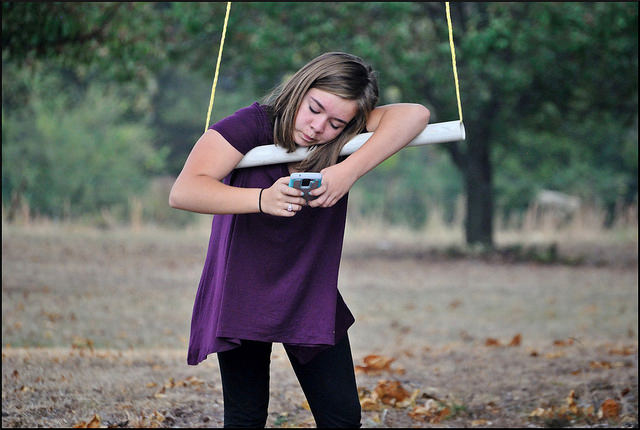Think for a moment about how you, as an adult, use social media. Do you post about a failure on Facebook, or do you keep it to yourself? How many selfie attempts do you make before you have the one you’re willing to share? When it comes to posting pictures on Instagram, do you weed through twenty to choose the one you look best in? Do you make sure no one can see the messy house in the background? Don’t worry, you aren’t alone. I’m calling this the “social media highlight reel effect.”
But now think about the fact that kids as young as 13 (and some younger, when they lie about their ages) are using Facebook in the same way. Think about how hard being a teenager was when we didn’t have our peers’ social media highlight reels to contend with. Do you remember fretting about outfits? Worrying about messing up in front of everyone? Dreaming about being popular? How much more obsessed with this precarious concept of popularity would you have been if you could measure it in “likes” and “hearts”? Is it any wonder that social media can be a kind of addiction to some teens?
So how do we address this?
The obvious solution seems to be to keep your kids off social media. Quite frankly, this is easier said than done. For one thing, not having a social media profile can be detrimental to your child’s social life in its own right. Then there is the risk that your child will sneak around behind your back and use a social media profile you don’t know about. If you really choose to try to keep your kids off social media, you could use an app like Screen Time, which allows you to monitor your child’s Web activity and block certain apps and sites from their devices.
However, we don’t recommend using a parental control app without initiating and maintaining an open dialogue about screen time limits and responsible internet usage. And those are the conversations that can help your child appropriately navigate social media to begin with.
No one’s perfect… even if they look that way on Instagram. It’s a fact that for the most part, people only post photos on social media in which they look their best. And recent research actually points to images on social media as more likely to cause people (particularly women and girls) to compare and criticize their own bodies than images on television or in print ads. Encourage your child to think critically about the images they are seeing. How many tries to get the perfect shot? Were photo filters used? And when it comes to celebrities, do they have a professional makeup artist? Some social media users — and not necessarily celebrities — even get paid to endorse products, so it’s good to have conversations about the ways clothing and makeup companies use Instagram in their marketing strategies.
Sad doesn’t sell. Let’s be honest, we all have that Facebook friend who is always complaining or depressed. It gets old, right? You may have even unfollowed them so as not to hurt their feelings. Most of us edit ourselves online, not only because we know that “unhappy” makes people uncomfortable, but because we don’t really want to publicize it when things go wrong in our lives. We publish our “ideal selves.” Talk to your kids about the fact that even though social media seems like real life, it’s at best a scrapbook — all of the best moments we want to show off. As Mary Ruth Nagel writes, “On social media you’ll see the wins, exotic vacations, and birthday parties. What you won’t see is that last week that same girl from fourth grade was the reason her team lost, or that the day before his exotic vacation the old boyfriend failed his math test, or that at that very same birthday celebration the girl from summer camp had her heart broken and ended the night in tears.”
Take breaks. There was an episode of the radio show This American Life not too long ago that featured three teenage girls who were very candid about their social media usage. The point of the segment was the fact that the girls used Instagram to build each others’ self esteem, but they admitted to watching their notifications in a way that was, for lack of a better word, obsessive. Even if you don’t succeed in convincing your child that social media is not an accurate representation of real life, you can encourage them to take breaks and focus on the real world. Here’s where a parental control app like Screen Time can work to everyone’s advantage, because it allows you to allot them a certain amount of time on social media sites per day or week.
Model a different way. You can’t expect your kids, especially your teenagers, to follow rules and guidelines that you don’t follow yourself. If you want them to spend less time on social media, you need to as well. And if you want them to be brave enough to be themselves, to take risks and make mistakes, try shaking things up with your own posts. Use your social media accounts to talk about your children’s accomplishments rather than to compliment their looks. Post that picture of yourself that isn’t so flattering. Talk about burning that cake. Or refrain from posting at all.
You can learn more about the Screen Time app from our interview with its creator here. Do you have a question about parenting in the digital age? Ask Dr. Kulman, or come talk to us on Facebook.
Featured image: Flickr user Kevin R. Colvin




